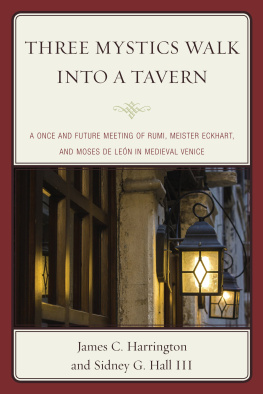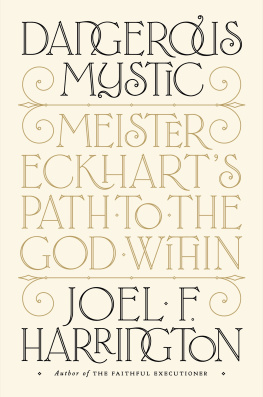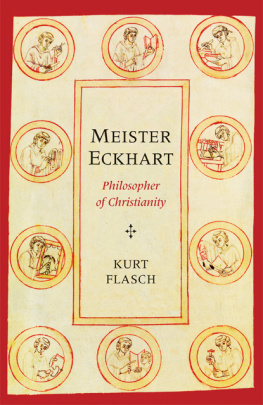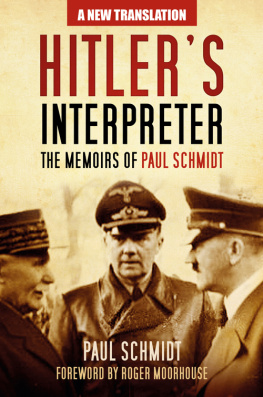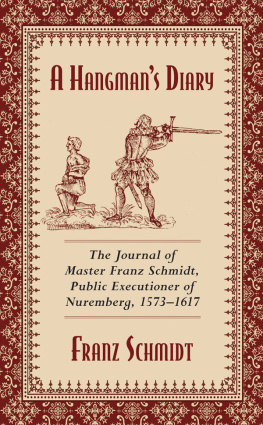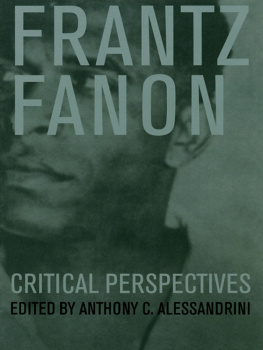THE EXECUTIONERS JOURNAL
Meister Frantz Schmidt of the Imperial City of Nuremberg
Translated by Joel F. Harrington
University of Virginia Press
Charlottesville and London
University of Virginia Press
2016 by the Rector and Visitors of the University of Virginia
All rights reserved
Printed in the United States of America on acid-free paper
First published 2016
1 3 5 7 9 8 6 4 2
Library of Congress Cataloging-in-Publication Data
Names: Harrington, Joel F. (Joel Francis) translator.
Title: The executioners journal : Meister Frantz Schmidt of the imperial city of
Nuremberg / translated by Joel F. Harrington.
Description: Charlottesville : University of Virginia Press, 2016. | Series: Studies in
early modern German history | Includes bibliographical references and indexes.
Identifiers: LCCN 2015043300 (print) | LCCN 2016023495 (ebook) | ISBN 9780813938691
(cloth : alk. paper) | ISBN 9780813938707 (pbk. : alk. paper) | ISBN 9780813938714 (e-book)
Subjects: LCSH: Schmidt, Franz, 1634. | Criminal procedureGermany
NurembergHistory. | CrimeGermanyNurembergHistory. |
Executions and executionersGermanyNurewmbergBiography.
Classification: LCC HV8551 .E94 2016 (print) | LCC HV8551 (ebook) | DDC 364.66092
[B]dc23
LC record available at http://lccn.loc.gov/2015043300
Cover art: Beheading of Lienhardt Kopp for murder, on October 26, 1602.
(Neubauersche Chronik, 1616; Staatsarchiv Nrnberg, F1 Nr. 42, 138v)
To Beth, George, and Charlotte
STUDIES IN
EARLY MODERN GERMAN HISTORY
H. C. Erik Midelfort, Editor
Illustrations
FIGURES
Panorama of Nuremberg, 1533
MAPS
Acknowledgments
I am grateful for help with perplexing translations and murky references from Hartmut Frommer, Helmut Graser, Erik Midelfort, and Ann Tlusty. My final editing of the book has been greatly aided by three research assistants: Christopher Mapes, who helped me in various ways with earlier versions of the text; Katie Martin, who assisted with early standardization of proper and place names; and Carolyn Taratko, who compiled the final tables in the appendixes while simultaneously serving as a superb copy editor. Maggie Birmingham Corbett assisted with the indexing. My external reviewers for the press, Joy Wiltenburg and Kathy Stuart, generously applied their wealth of knowledge to the text, yielding numerous helpful suggestions that greatly improved the end result. I also thank Dick Holway, Anna Kariel, Morgan Myers, and Ellen Satrom of the University of Virginia Press and Susan Deeks for their careful work in guiding the manuscript to publication. Finally, as always, I express the deepest appreciation to my familyBeth, George, and Charlotteand dedicate this work to them.
Abbreviations
| ASB | Amts- und Standbcher; Staatsarchiv Nrnberg, Bestand 52b |
| FSJ | Frantz Schmidts journal; Stadtbibliothek Nrnberg Amb 652.2 |
| JHJ | Journal of Prison Chaplain Johannes Hagendorn (15831624); Germanisches Nationalmuseum, 3857 Hs |
| LKAN | Landeskirchlichesarchiv Nrnberg |
| Restitution | Haus-, Hof-, Staatsarchiv Wien, Restitutionen, Fasz. 6/S, Franz Schmidt, 1624. |
| RV | Ratsverla (decree of Nuremberg City Council); Staatsarchiv Nrnberg, Rep. 60a |
| StaatsAB | Staatsarchiv Bamberg |
| StaatsAN | Staatsarchiv Nrnberg |
| StadtAB | Stadtarchiv Bamberg |
| StadtAN | Stadtarchiv Nrnberg |
Notes on Usage
QUOTATIONS FROM FRANTZ SCHMIDT
All direct quotations from Schmidt in the introduction and afterword are set in italics.
CURRENCY
There were many local, imperial, and foreign coins in circulation during the early modern era in German lands, and currency exchange values also naturally varied over time. For scope and comparison, I have provided the approximate equivalent of each sum in florins (or gulden; abbreviated fl.), the largest denomination. A household servant or municipal guard during this period might earn ten to fifteen gulden per year; a schoolteacher, fifty; and a municipal jurist, three hundred or four hundred. A loaf of bread cost four pence (0.03 fl.); a quart of wine, about thirty pence (0.25 fl.); and a years rent in a slum apartment, about 6 fl. The approximate equivalencies are as follows: 1 gulden (fl.) = 0.85 thaler = 15 batzen = 20 schillings = 60 kreuzer = 120 pence = 240 heller.

Opposite: The imperial city of Nuremberg as viewed from the southeast, with the imperial castle looming in the background and the gallows and Raven Stone drawn prominently just outside the city walls. From the Schedlesche Weltchronik (1533). (StadtAN A4/VIII, Nr. 188)
Introduction
Frantz Schmidt was born during the first half of 1554 in what is today the northeastern Bavarian city of Hof an der Saale. No other details of his family background are known.
The most traumatic and transformational event in Frantzs life occurred on Monday, October 15, 1553, shortly before his own arrival in the world. The city of Hof had just succumbed to a disastrous siege, instigated by a broad coalition of Protestant and Catholic states in response to years of raids and other transgressions by the citys ambitious young lord, Albrecht II Alcibiades (b. 1522), Margrave of Brandenburg-Kulmbach. Abandoned by their prince during six weeks of siege, Hofs angry citizens had to be forced by their conquerors to formally welcome their own lord when he finally rode into town with an entourage of sixty knights on October 12. Three days later, the widely despised Albrecht had three local gunsmiths arrested in an alleged plot on his life. Rather than sending for a traveling professional to execute themthe usual course of actionthe headstrong margrave invoked an ancient custom and commanded a bystander to carry out the deed on the spot. The man singled out for this terrible distinction was Heinrich Schmidt. Despite protests from the respectable woodsman, the margrave insisted that
As Heinrich Schmidt had predicted, from his moment of capitulation to Albrechts order he and his family were ruthlessly and definitively excluded from honorable society by their neighbors and former friends, tainted by their association simultaneously with an odious trade and a reviled tyrant. Albrechts subsequent imperial ban and death in exile perhaps provided the Schmidts with some satisfaction, but the social consequences of his command that October day could not be undone. Young Frantz thus grew up the son of a hangman, receiving some rudimentary education (probably at home) but destined to follow in his fathers new profession. It is possible that Heinrich Schmidt, still in the employ of the margraviate, relocated his family to nearby Bayreuth upon his second marriage in 1560, but given the indelible stain of his work, only a better-paying and more prestigious executioner position elsewhere could offer him any true social mobility. After at least two rejections from the imperial city of Nuremberg, he finally succeeded in securing the prestigious job of executioner for the prince-bishopric of Bamberg.


